| The Go!! Show | |
|---|---|
| Genre | Music television |
| Directed by | Godfrey Phillips |
| Creative director | Bruce Rowland |
| Presented by |
|
| Composer | The Strangers |
| Country of origin | Australia |
| Original language | English |
| No. of seasons | 3 |
| No. of episodes | 222 |
| Production | |
| Producers |
|
| Production location | Nunawading, Victoria |
| Running time |
|
| Production companies |
|
| Original release | |
| Network | |
| Release | August 1964 – August 1967 |
The Go!! Show (also known simply as Go!!) was an Australian popular music television series which was produced before a live audience [1] and aired on Network Ten ATV-0, Melbourne, from August 1964 to August 1967, running one hour three nights a night. [1]
It was produced by Willard-King Productions, DYT Productions. [2] Over its run it was hosted, in turn, by Alan Field (1964), Ian Turpie (1964–66) and Johnny Young (1966–67) and Ronnie Burns [1]
The series was known for having a regular roster of performers including The Strangers, a line of Go-Go dancing who appeared from week to week, Olivia Newton-John and Pat Carroll, Lynne Randell, Normie Rowe and The Twilights. [1]
When the Melbourne-based Go Show !! premiered in August 1964, the other major competing television popular music show series Bandstand , was made by the Nine Network, which was made in Sydney. While that series had been an important outlet for the first wave of Australian rock'n'roll, it did not engage strongly with the so-called "Beat Boom" acts which emerged in the mid-1960s and onwards; Bandstand subsequently settled into a more mainstream musical variety format aimed at a broad general audience.
Unusually the main competition for Go!! was broadcast on the same station: in December 1965, ATV-0 commissioned a second pop show, Kommotion , produced by the Willard-King organisation and hosted by popular Melbourne radio and TV personality, Ken Sparkes. [3] It was broadcast with five episodes each week day. [3]
The Go!! Show focussed on the more sophisticated youth market and tended to concentrate on local solo performers, while Kommotion (which was in part modelled on the American series, Shindig! ) pursued a more group- and chart-oriented format, as well as featuring a troupe of go-go dancers and a regular team of young performers who mimed to the latest overseas hits. [4]
The Go!! Show was made by DYT Productions, a production company founded and run by Australian musician Horrie Dargie with partners Arthur Young and Johnny Tillbrook, with producers Dennis Smith, Godfrey Phillips and Julian Jover working on Go!! specifically. [1] It premiered in August 1964, just after the Beatles' Australian tour and just days after ATV-0's official opening. It was videotaped before a live audience, with early episodes being one-hour long and it screened three nights per week. In its third season broadcast 1966–67, it was shortened to thirty minutes. Because national television networking was only just being established in Australia, The Go!! Show was only seen in Victoria for its first two years.
There were three hosts of Go!! during its run: the first was North-English comedian Alan Field, who had compered the July 1964 Beatles tour. [5] Singer-actor Ian Turpie took over from Field from episode 26 until August 1966 when Turpie quit, stating that pursuing a career as an adult entertainer forced him to resign). Pop star and future Young Talent Time host Johnny Young took over. In an incident in December 1966, Young arrived at the ATV studio complaining of feeling "tired and hot". During taping of an episode, Young began "fumbling and making silly mistakes", and reportedly forgot the name of the artist he was meant to introduce, and subsequently collapsed on camera; the incident was attributed to Young's hectic schedule. [6]
The Go!! Show almost exclusively featured local performers and concentrated on solo singers, who were typically backed by the show's house band The Strangers. It featured many of the major Australian pop stars of the time, including DYT-managed singer April Byron, resident female singer of the first season, Bobby & Laurie, The Spinning Wheels, Lynne Randell, Johnny Devlin, Colin Cook, The Twilights, Mike Furber and Normie Rowe. [7] [8] Olivia Newton-John and Pat Carroll were regulars with Newton-John making at least sixteen appearances between February 1965 and December 1966. Singer and composer Buddy England auditioned for the premiere episode and became a regular performer for the entire run of the series.
The Strangers also performed their own material on weekly basis throughout the life of the show. They notably secured one of the first sponsorship deals in Australian pop and were provided with a set of distinctive "El Toro" model electric guitars and basses made by the noted Melbourne-based luthier Maton. Strangers singer-guitarist John Farrar became a prominent session arranger in the late '60s before moving overseas and achieving great international success in the 1970s and beyond as a producer for Olivia Newton-John. He also wrote two additional songs for the Grease: The Original Soundtrack from the Motion Picture of the film version of the Broadway musical Grease which became the biggest hits of the movie.
Coinciding with the premiere of the TV series, production team DYT launched their own record label Go!! Records and The Go!! Show frequently cross-promoted acts signed to the label. Unconnected pop magazine Go-Set (1966–1974) which coincidentally shared the "Go" brand and market formed a marketing triumvirate.
Although it was extremely popular, attracting as many as 400,000 viewers each week, The Go!! Show was cancelled suddenly in August 1967 after more than 200 episodes, at virtually the same time as the axing of Kommotion. According to Kommotion host Ken Sparkes, the main cause was the imposition of an Actors Equity ban on miming in TV programs, which effectively put both shows out of business.
Like most pop shows of the time, it was customary for performers to mime to a recording of their latest hit; Kommotion typically used commercial recordings of current hits, whereas Go!! (like the BBC's Top of the Pops ) often used pre-taped tracks specially recorded for the show. With the cancellation of the series the Go!! label soon folded since its main means of promotion had been remov The network replaced the cancelled shows with a new Saturday morning pop show Uptight , which was nationally networked; it ran until the end of 1969 when it was 'rebranded' as Happening '70 (followed by Happening '71 and '72).
Like most other Australian TV shows from this period, there is very little surviving archival material from The Go!! Show. Most of the more than 200 episodes were subsequently destroyed when the network archives ran out of storage space, although numerous fragments and several entire programs have survived. The exact amount of remaining footage is uncertain, but at least seven episodes from late 1966 are known to have survived in their entirety. This material was copied from tapes in the archive sometime in the late 1990s and circulated widely among collectors over the next few years; some clips have since made their way onto YouTube.

Johnny Young is a Dutch Australian singer, composer, record producer, disc jockey, television producer and host. Originally from Rotterdam, The Netherlands, his family settled in Perth in the early 1950s. Young was a 1960s pop singer and had a number-one hit with the double-A-sided single, "Step Back" and a cover of the Strangeloves' "Cara-lyn" in 1966. Young's profile was enhanced by a concurrent stint as host of TV pop music program The Go!! Show. Also in the mid-1960s, Young toured with the Rolling Stones and supported Roy Orbison.
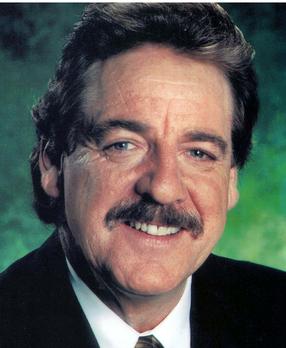
Ian Bruce Turpie, sometimes referred to as Turps, was an Australian performer, actor, pop singer and presenter. He was the host of the teen pop music TV show, The Go!! Show (1965–66) and various TV game shows, The Price Is Right, and Supermarket Sweep (1992–1994). As a TV actor he portrayed Keith Warne on Swift and Shift Couriers and Wazza and Narrator in Housos (2011). He was diagnosed with oesophageal cancer in 2011 and died the following year, aged 68.
Stanley Rofe was an Australian rock'n'roll disc jockey and music news reporter.
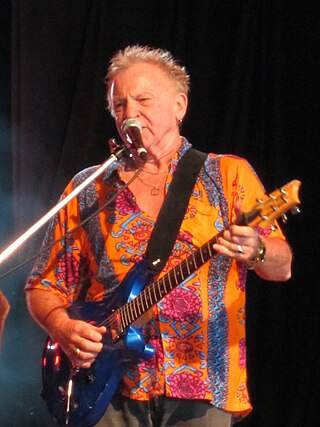
Norman John Rowe is an Australian singer and songwriter. He rose to national prominence in the mid-1960s as a pop star and teen idol, backed by The Playboys. His 1965 double A-side "Que Sera Sera"/"Shakin' All Over" was one of the most successful Australian singles of the decade.
Go-Set was the first Australian pop music newspaper, published weekly from 2 February 1966 to 24 August 1974, and was founded in Melbourne by Phillip Frazer, Peter Raphael and Tony Schauble. Widely described as a pop music "bible", it became an influential publication, introduced the first national pop record charts and featured many notable contributors including fashion designer Prue Acton, journalist Lily Brett, rock writer / band manager Vince Lovegrove, music commentator Ian "Molly" Meldrum, rock writer / music historian Ed Nimmervoll and radio DJ Stan Rofe. It spawned the original Australian edition of Rolling Stone magazine in late 1972.
Ronald Leslie BurnsAM is an Australian retired rock singer-songwriter and musician.
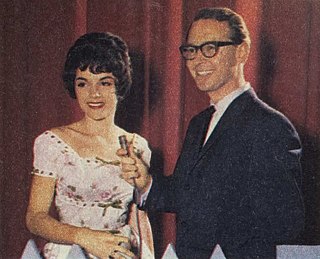
Bandstand is an Australian live pop music, variety television program screened from November 1958 to June 1972. Featuring both local and international music artists, and produced in-house at the studios of the Nine Network in Willoughby, New South Wales, it was originally broadcast only in New South Wales, It became a national program in the early 1960s as the network expanded into other Australian states. The host of Bandstand for its entire existence was radio presenter and television newsreader Brian Henderson.
The Strangers were an Australian rock band formed in 1961 and existed until 1975. The band started out playing instrumental songs in a style similar to The Shadows, with influences from Cliff Richard. The original line-up was Laurie Arthur, Peter Robinson (bass), Graeme "Garth" Thompson (drums) and Fred Wieland. Robinson had previously played with a local band The Thunderbirds and went on to replace Athol Guy in the Seekers in the late 1970s.
The Deakins were an Australian rock group which formed in 1963. This was the era of the local version of beat music; which included 1960s garage rock, proto-punk and pop. Their initial line-up included Jeff W Donoghue on bass guitar, Ian Kinkead on drums, and Bob Millar and Gary Schober on guitars. The later Deakins 'trio' released two singles in 1966, "Tonight You're Gonna Fall in Love with Me" and "Take Me for a Little While", via GO!!. The band regularly appeared on the related TV pop music weekly series, The Go!! Show, and on daily weekday show, Kommotion, both broadcast by ATV-0. The Deakins disbanded in 1973.
Lynne Randell was an English Australian pop singer. For three years in the mid-1960s, she was Australia's most popular female performer and had hits with "Heart" and "Goin' Out of My Head" in 1966, and "Ciao Baby" in 1967. In 1967, Randell toured the United States with The Monkees and performed on-stage with support act Jimi Hendrix. She wrote for teen magazine, Go-Set, and television programme guide, TV Week. While on the US tour, Randell became addicted to methamphetamine, an addiction which she battled for most of her life.
Go Records was a small independent Melbourne-based recording label which ran from 1964 to 1968. Its releases were manufactured and distributed by the Melbourne-based recording and electronics company Astor.
Sunshine Records was an Australian independent pop music record label of the mid-1960s. It was established in late 1964 by promoter Ivan Dayman in collaboration with musician-producer-arranger-songwriter Pat Aulton and entrepreneur, producer and songwriter Nat Kipner. Although his enterprise was short-lived, Dayman was arguably the first Australian popular music entrepreneur to create a fully integrated pop music company that included artist management and bookings, record production, record labels, venue management and concert promotion.
Australian pop music awards are a series of inter-related national awards that gave recognition to popular musical artists and have included the Go-Set pop poll (1966–1972); TV Week King of Pop Awards (1967–1978); TV Week and Countdown Music Awards (1979–1980); the Countdown Awards (1981–1982) and Countdown Music and Video Awards (1983–1987). Early awards were based on popular voting from readers of teenage pop music newspaper Go-Set and television program guide TV Week. They were followed by responses from viewers of Countdown, a TV pop music series (1974–1987) on national broadcaster Australian Broadcasting Corporation (ABC). Some of the later award ceremonies incorporated listed nominees and peer-voted awards. From 1987 the Australian Recording Industry Association (ARIA) instituted its own peer-voted ARIA Music Awards.

Ian Alexander "Molly" Meldrum AM is an Australian music critic, journalist, record producer and musical entrepreneur. He was the talent coordinator, on-air interviewer, and music news presenter on the former popular music program Countdown (1974–87) and is widely recognised for his trademark Stetson hat, which he has regularly worn in public since the 1980s.
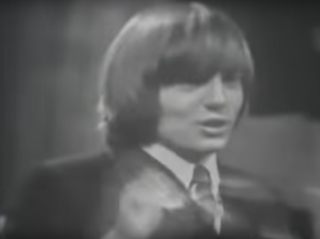
Michael Alexander Furber was an English-born Australian entertainer popular in the mid-1960s as the lead singer of Mike Furber and the Bowery Boys. Furber's group had hits with "Just a Poor Boy", "You Stole My Love" and "That's When Happiness Began". In the Go Set Pop Poll, Furber was voted in the top 5 as most popular Male Vocalist in both 1966 and 1967. Furber's subsequent solo singing career was less successful and in the early 1970s he turned to stage musicals: including Godspell and Nuclear. According to police investigators Furber committed suicide on 10 May 1973, by hanging, in the garage of his home. Rock music historian, Ian McFarlane, writes, "Reputedly in the depths of depression, he hanged himself... It has been suggested, however, that Furber was actually murdered because he had befriended a Kings Cross prostitute."
Kommotion was a popular Australian "Top 40" pop music TV show that premiered in December 1964. The program was hosted by popular disc jockey Ken Sparkes, who was one of the main presenters at Melbourne pop radio station 3UZ. In 1965, after the end of his previous series, Teen Scene, pop singer Johnny Chester became the associate producer of the program.

April Elizabeth Dove Potts, known professionally as April Byron, was an Australian pop singer and songwriter. She was the first female artist to collaborate with the Bee Gees after their formation as a band, on the 1966 single "He's a Thief" / "A Long Time Ago".
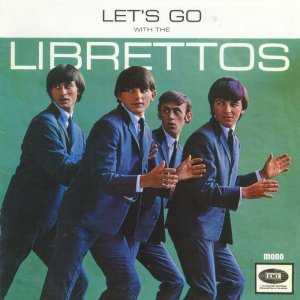
The Librettos was a New Zealand pop/R&B group, active from 1960 to 1966. They were one of New Zealand's most popular bands in 1964-65, and after relocating to Sydney they gained recognition in Australia for their polished live performances and their 1966 version of the Paul Revere & The Raiders song "Kicks". Several members of the group went on to other notable bands of the 1960s and 1970s - bassist Brian Peacock co-founded the highly regarded Anglo-Australian "progressive pop" band Procession, Rod Stone joined popular Australian '60s soul group The Groove, and drummer Craig Collinge later played with Manfred Mann Chapter Three and UK 1970s "proto-punk" band Third World War.
MPD Ltd or M. P. D. Limited were an Australian pop music band formed in 1965 by core members Mike Brady on lead vocals and guitar, Pete Watson on bass guitar and lead vocals, and Danny Finley on drums. They used their first initials to provide the name. Their popular singles were "Little Boy Sad" and "Lonely Boy" (October). MPD Ltd issued an album, The Best of MPD Ltd, in 1966 on Go!! Records before disbanding in 1967. Pete Watson died of an illness on 30 April 1972.